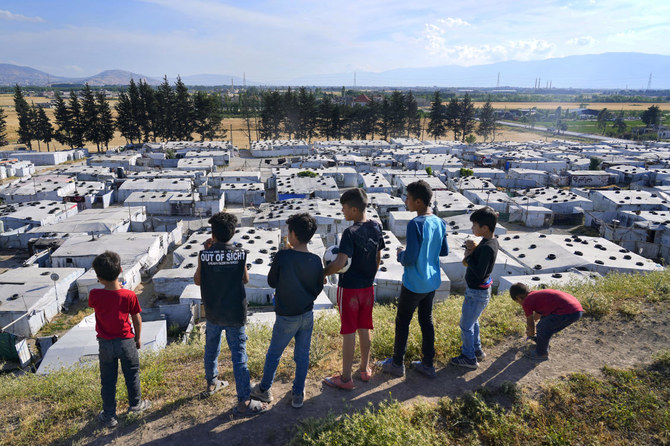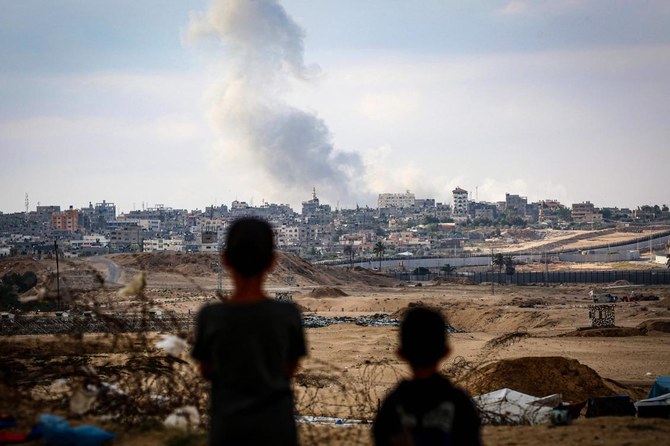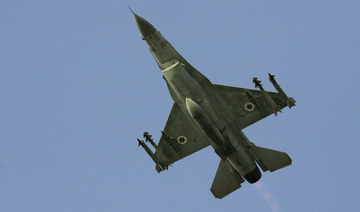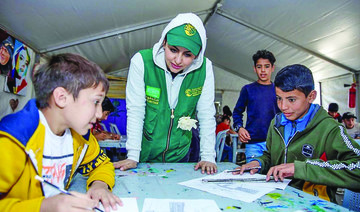BAR ELIAS, Lebanon: Six months after she got the call informing her that her UN assistance would be cut, Najwa Al-Jassem is struggling to feed her four children and pay rent for their tent in a Syrian refugee camp in Lebanon’s eastern Bekaa Valley.
She once received food rations and cash that covered most of their modest monthly expenses. The family now only gets the equivalent of $20 a month, which just covers the rent for their cramped tent.
Her husband gets only sporadic day labor and “my kids are too young for me to send them to work the fields,” she told The Associated Press in the camp near the town of Bar Elias. “We’re eating one meal a day.”
Aid agencies will struggle to draw the world’s attention back to the plight of Syrians like Al-Jassem on Wednesday at an annual donor conference hosted by the European Union in Brussels for humanitarian aid to respond to the Syrian crisis.
Funding from the two-day conference will also go toward providing aid to Syrians within the war-torn country and to some 5.7 million Syrian refugees living in neighboring countries, particularly Turkiye, Lebanon and Jordan.
This year, organizers aim to raise some $11.2 billion, though humanitarian officials acknowledged that pledges will likely fall short.
On Tuesday, a day before the conference, the World Food Program announced that it was faced with an “unprecedented funding crisis” and would cut aid to 2.5 million out of the 5.5 million people in Syria who had been receiving food assistance.
The conference comes as Syria’s protracted uprising-turned-civil-conflict has entered its 13th year, and after a deadly 7.8 magnitude earthquake rocked large swaths of Syria in February, further compounding its misery. The World Bank estimated over $5 billion in damages, as the quake destroyed homes and hospitals and further crippled Syria’s poor power and water infrastructure.
It also comes at a politically precarious time for refugees living in neighboring countries. Syrian President Bashar Assad recently received a major political lifeline with the return of Damascus to the Arab League, and Syria’s neighbors have, in return, called for a mass repatriation of refugees.
Anti-refugee rhetoric has surged in neighboring Lebanon and Turkiye, both dealing with economic and political crises.
In Lebanon, where officials have put the blame for the country’s economic crisis onto the country’s estimated 1.5 million refugees, authorities have imposed curfews on refugees and restricted their ability to rent homes. Rights groups have said the Lebanese military has deported hundreds of Syrian refugees in recent months.
In Turkiye, where Syrians were once welcomed with compassion, repatriation of the roughly 3.7 million refugees became a top theme in last month’s presidential and parliamentary elections, which ended in a new term for incumbent President Recep Tayyip Erdogan.
Erdogan’s government for years defended its open-door policy, but has in recent years been building housing developments in areas of northwestern Syria controlled by Ankara-backed Syrian opposition groups, with the stated aim of encouraging refugee returns. Ankara and Damascus have also been holding talks in Moscow to improve strained relations.
The government has also carried out sporadic forcible deportations, while Erdogan’s challengers took a harder line, vowing to deport refugees en masse.
While some Syrian refugees have voluntarily returned from Turkiye and Lebanon, most say the situation is too volatile.
At the camp in Lebanon, Fteim Al-Janoud struggled to hold back her tears as she talked about how she and her husband can only afford to send one of her six children to school. But the refugee from Syria’s northern Aleppo province said the situation there is even worse, both in terms of security and material concerns.
“If the conditions were good and if our homes were fixed so we could live peacefully and comfortably, we wouldn’t have a problem going back to Syria, even with Assad still there,” she said.
Despite the deteriorating situation for Syrians, aid has dwindled in recent years, as donors rushed to support over 5 million Ukrainian refugees and over 7 million internally displaced in the conflict-hit European country. The war in Ukraine, a global bread basket, also sparked a food inflation surge on the heels of the COVID-19 pandemic that rocked the global economy for years.
“We see needs are increasing, and we also see that that donor funding is gradually going down,” said Ivo Freijsen, the UN refugee agency’s representative to Lebanon, where some 90 percent of refugees live in extreme poverty and are dependent on aid.
“From a humanitarian point of view, it means that more people will be suffering,” he said. “We need to be seeking to see funding levels stay at the same level and actually increase.”
At last year’s conference in Brussels, donors pledged $6.7 billion, falling billions short of the UN’s $10.5 billion appeal, split almost evenly to assist Syrians inside the war-torn country and refugees. The funding shortage forced hospitals in opposition-held northwestern Syria to cut back services, while the UN World Food Program cut the size of its monthly rations for the more than 1 million people it serves in that area.
“We know that Ukraine has taken a big toll,” said UN Resident and Humanitarian Coordinator in Lebanon Imran Riza. “We know that Sudan has now become also quite a priority. It’s a difficult time and it’s a time that’s also following COVID and everything else that happened that hit economies so hard across the globe.”
Given those difficulties, he said international donors need to “move toward much more sustainable interventions” rather than remaining in crisis mode.
At the camp in the Bekaa Valley, Al-Jassem says she’s struggling to cope with mounting debts she and her husband have to cover unpaid rent and medical expenses.
But she’s more worried about the well-being of her children, who have lived their entire lives in a refugee camp in worsening conditions.
“The kids sometimes go to school without having breakfast,” she explained. “Their teacher would sometimes call me and ask why they didn’t bring a sandwich with them, and I would say it’s because I have nothing in the pantry.”
As conditions for Syrians worsen, aid organizations struggle to catch the world’s attention again
https://arab.news/5pvns
As conditions for Syrians worsen, aid organizations struggle to catch the world’s attention again

EU urges Israel to end Rafah military operation ‘immediately’

- EU statement: ‘Further disrupting the distribution of humanitarian aid in Gaza and is leading to more internal displacement, exposure to famine and human suffering’
“Should Israel continue its military operation in Rafah, it would inevitably put a heavy strain on the EU’s relationship with Israel,” said the statement issued in the EU’s name by its foreign policy chief Josep Borrell.
“The European Union urges Israel to end its military operation in Rafah immediately,” the statement said, warning it was “further disrupting the distribution of humanitarian aid in Gaza and is leading to more internal displacement, exposure to famine and human suffering.”
The bloc — the main aid donor for the Palestinian territories and Israel’s biggest trading partner — said more than a million people in and around Rafah had been ordered by Israel to flee the area to other zones the UN says cannot be considered safe.
“While the EU recognizes Israel’s right to defend itself, Israel must do so in line with International Humanitarian Law and provide safety to civilians,” it said.
The law requires Israel to allow in humanitarian aid, the statement stressed.
The EU also condemned a Hamas attack on the Kerem Shalom border crossing which blocked humanitarian relief supplies.
“We call on all parties to redouble their efforts to achieve an immediate ceasefire and the unconditional release of all hostages held by Hamas,” it said.
Israel’s military operations in Gaza were launched in retaliation for Hamas’s October 7 attack on Israeli which killed more than 1,170 people, mostly civilians, and saw around 250 hostages taken, according to an AFP tally of Israeli official figures.
Israel’s military has conducted a relentless bombardment from the air and a ground offensive inside Gaza that has killed more than 35,000, mostly civilians, according to the Gaza health ministry.
Israel’s main allies, the United States and the EU, as well as the United Nations, have all warned Israel against a major operation in Rafah given that it would add to the civilian toll.
Kuwait’s emir calls on new government to pursue reforms

RIYADH: Kuwait’s Emir Sheikh Mishal Al-Ahmad Al-Jaber Al-Sabah on Wednesday met with the new prime minister and his government.
According to the Kuwait News Agency, Sheikh Mishal said: “We are in a new phase of reforms and serious actions must be taken.”
He added that ministers should “accelerate the implementation of long-awaited strategic development projects, address needed files and work on the infrastructure projects, develop healthcare and the educational system, and take into account transparency and to preserve public funds.”
Sheikh Mishal appointed Sheikh Ahmad Abdullah Al-Ahmad Al-Sabah as prime minister in April, and dissolved parliament last Friday in a televised speech.
He urged ministers to ensure that Kuwait has a strong and sustainable economy by investing in human capital and promoting innovation and scientific research.
UN launches probe into first international staff killed by unidentified strike in Rafah

- Retired Indian army officer Waibhav Anil Kale was on route to the European Hospital in Rafah along with a colleague, who was also injured in the attack
NEW DELHI: The United Nations has launched an investigation into an unidentified strike on a UN car in Rafah on Monday that killed its first international staff in Gaza since Oct. 7, a spokesperson for the UN Secretary General said.
The staff member, a retired Indian Army officer named Waibhav Anil Kale, was working with the UN Department of Safety and Security and was on route to the European Hospital in Rafah along with a colleague, who was also injured in the attack.
Israel has been moving deeper into Rafah in southern Gaza, where more than a million people had sought shelter, and its forces pounded the enclave’s north on Tuesday in some of the fiercest attacks in months.
Israel’s international allies and aid groups have repeatedly warned against a ground incursion into Rafah, where many Palestinians fled, and Israel says four Hamas battalions are holed up. Israel says it must root out the remaining fighters.
In a statement on Monday after Kale’s death, UN Secretary General Antonio Guterres reiterated an “urgent appeal for an immediate humanitarian ceasefire and for the release of all hostages,” saying the conflict in Gaza was continuing to take a heavy toll “not only on civilians, but also on humanitarian workers.”
Palestinian health authorities say Israel’s ground and air campaign in Gaza since Oct. 7 has killed more than 35,000 people and driven most of the enclave’s 2.3 million people from their homes.
His deputy spokesperson Farhan Haq said on Tuesday the UN has established a fact-finding panel to determine the responsibility for the attack.
“It’s very early in the investigation, and details of the incident are still being verified with the Israeli Defense Force,” he said.
There are 71 international UN staff members in Gaza currently, he said.
In its only comment on the matter yet, India’s mission to the UN confirmed Kale’s identity on Tuesday, saying it was “deeply saddened” by his loss.
Israel, which launched its Gaza operation after an attack on Oct. 7 by Hamas-led gunmen who killed some 1,200 people and took more than 250 hostages, according to its tallies, has ordered civilians to evacuate parts of Rafah.
The main United Nations aid agency in Gaza, UNRWA estimates some 450,000 people have fled the city since May 6. More than a million civilians had sought refuge there.
Libya war crimes probe to advance next year: ICC prosecutor

- The Security Council referred the situation in Libya to the ICC in February 2011 following a violent crackdown on unprecedented protests against the regime of Muammar Qaddafi
UNITED NATIONS, United States: The International Criminal Court prosecutor probing war crimes committed in Libya since 2011 announced Monday his plans to complete the investigation phase by the end of 2025.
Presenting his regular report before the United Nations Security Council, Karim Khan said that “strong progress” had been made in the last 18 months, thanks in particular to better cooperation from Libyan authorities.
“Our work is moving forward with increased speed and with a focus on trying to deliver on the legitimate expectations of the council and of the people of Libya,” Khan said.
He added that in the last six months, his team had completed 18 missions in three areas of Libya, collecting more than 800 pieces of evidence including video and audio material.
Khan said he saw announcing a timeline to complete the investigation phase as a “landmark moment” in the case.
“Of course, it’s not going to be easy. It’s going to require cooperation, candor, a ‘can do’ attitude from my office but also from the authorities in Libya,” he added.
“The aim would be to give effect to arrest warrants and to have initial proceedings start before the court in relation to at least one warrant by the end of next year,” Khan said.
The Security Council referred the situation in Libya to the ICC in February 2011 following a violent crackdown on unprecedented protests against the regime of Muammar Qaddafi.
So far, the investigation opened by the court in March 2011 has produced three cases related to crimes against humanity and war crimes, though some proceedings were abandoned after the death of suspects.
An arrest warrant remains in place for Seif Al-Islam Qaddafi, the son of the assassinated Libyan dictator who was killed by rebel forces in October 2011.
Libya has since been plagued by fighting, with power divided between a UN-recognized Tripoli government and a rival administration in the country’s east.
Palestinians rally at historic villages in northern Israel

- The descendants of the 160,000 Palestinians who managed to remain in what became Israel presently number about 1.4 million, around 20 percent of Israel’s population
- Israel has killed more than 35,000 Palestinians in Gaza, mostly women and children, according to the health ministry in the Hamas-run territory
SHEFA-AMR: Thousands of people took part Tuesday in an annual march through the ruins of villages that Palestinians were expelled from during the 1948 war that led to Israel’s creation.
Wrapped in keffiyeh scarves and waving Palestinian flags, men and women rallied through the abandoned villages of Al-Kassayer and Al-Husha — many holding signs with the names of dozens of other demolished villages their families were displaced from.
“Your Independence Day is our catastrophe,” reads the rallying slogan for the protest that took place as Israelis celebrated the 76th anniversary of the proclamation of the State of Israel.
The protest this year was taking place against the backdrop of the ongoing war in Gaza, where fighting between Israel and Palestinian militant group Hamas has displaced the majority of the population, according to the United Nations.
Among those marching Tuesday was 88-year-old Abdul Rahman Al-Sabah.
He described how members of the Haganah, a Zionist paramilitary group, forced his family out of Al-Kassayer, near the northern city of Haifa, when he was a child.
They “blew up our village, Al-Kassayer, and the village of Al-Husha so that we would not return to them, and they planted mines,” he said, his eyes glistening with tears.
The family was displaced to the nearby town of Shefa-Amr.
“But we continued (going back), my mother and I, and groups from the village, because it was harvest season, and we wanted to live and eat,” he said.
“We had nothing, and whoever was caught by the Israelis was imprisoned.”
Palestinians remember this as the “Nakba,” or catastrophe, when around 760,000 Palestinians fled or were driven from their homes during the war that led to the creation of Israel.
The descendants of the 160,000 Palestinians who managed to remain in what became Israel presently number about 1.4 million, around 20 percent of Israel’s population.
Many of today’s Arab Israelis remain deeply connected to their historic land.
At Tuesday’s march, one man carried a small sign with “Lubya,” the name of what was once a Palestinian village near Tiberias.
Like many other Palestinian villages, Al-Husha and Al-Kassayer witnessed fierce battles in mid-April 1948, according to historians of the Haganah, among the Jewish armed groups that formed the core of what became the Israeli military.
Today, the kibbutz communities of Osha, Ramat Yohanan and Kfar Hamakabi can be found on parts of land that once housed the two villages.
“During the attack on our village Al-Husha, my father took my mother, and they rode a horse to the city of Shefa-Amr,” said Musa Al-Saghir, 75, whose village had been largely made up of people who immigrated from Algeria in the 1880s.
“When they returned to see the house, the Haganah forces had blown up the village and its houses,” said the activist from a group advocating for the right of return for displaced Arabs.
Naila Awad, 50, from the village of Reineh near Nazareth, explained that the activists were demanding both the return of displaced people to their demolished villages within Israel, as well as the return of the millions of Palestinian refugees living in the West Bank, Gaza and other countries.
“No matter how much you try to break us and arrest us, we will remain on our lands,” she insisted.





















